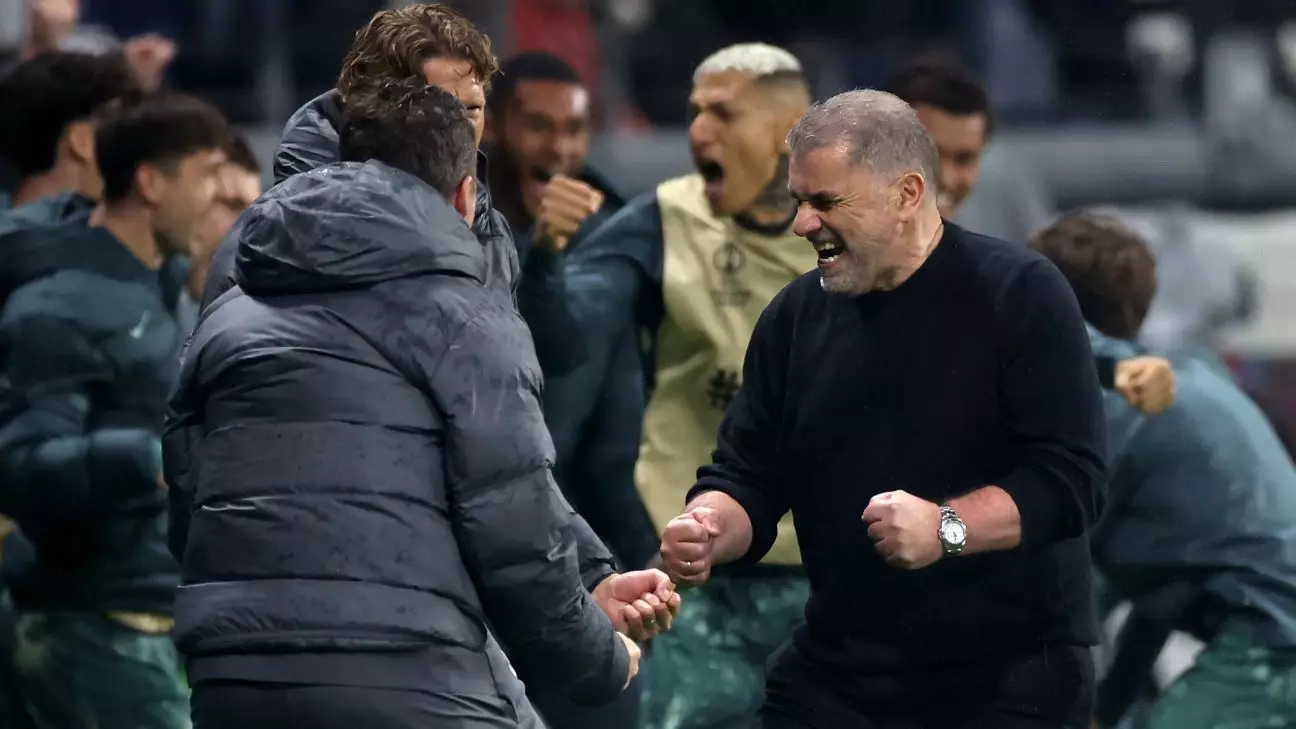In the ever-intense realm of professional football, coaching tenures are often marked by skepticism, especially when performances waver. Conversely, Ange Postecoglou, the head coach of Tottenham Hotspur, stands at a pivotal crossroads. With the shadow of doubt looming over him earlier this season, Postecoglou’s journey is now infused with the glimmer of potential triumph as Tottenham eyes silverware following a resolute display in the UEFA Europa League against Eintracht Frankfurt. This match not only served as a turning point for Spurs but also propelled Postecoglou into a narrative that might render his critics silenced, at least for now.
The stakes were pronounced; reports indicated that a lackluster performance against Eintracht could lead to Postecoglou’s dismissal. Such scenarios have often plagued coaches under pressure, where one match can significantly impact their future. However, this potential pitfall transformed into a moment of vindication when Dominic Solanke’s penalty secured a 1-0 victory, allowing Spurs to progress to the semifinals with a 2-1 aggregate score. The news came as a breath of fresh air for Postecoglou. The looming threats to his managerial position are now overshadowed by the prospect of lifting a trophy, a hallmark of his career during his second seasons at various clubs.
Finding Their Identity
Despite the win, Postecoglou has been navigating through turbulent waters since taking charge. Traditionally known for their attacking prowess, Tottenham’s season initially exemplified a disparity between style and results. The team struggled, plagued by injuries and a faltering structure that often felt ill-prepared for adversity. This lack of resilience led to crushing defeats, with fans and pundits alike questioning the very mentality of a side that once prided itself on being competitive among England’s elite. Yet, the match against Eintracht showcased a team that appeared rejuvenated, balanced across all sectors—defensively resolute, midfielders pulling strings with authority, and attackers hungry for goals.
Solanke’s penalty highlighted more than just skill; it signaled the awakening of an identity that many had feared was lost. The inclusion of key players returning from injuries demonstrated that depth plays a crucial role in success. Enhanced performances from players like Heung-Min Son and Cristian Romero showed that a fully-fit squad can elevate Spurs into a formidable team on any given night—a revelation Postecoglou had been yearning for throughout the rollercoaster season.
Eyes on the Prize
As the semifinals approach, the focus turns to Bodø/Glimt, the current Norwegian champions who defied expectations by eliminating Italian side Lazio. Their once-overlooked status now transitions them into serious contenders, and Spurs must respect their newfound capability. For Postecoglou, this matchup is not merely an opportunity to advance to a coveted final; it serves as a testament to his assertion that he eventually wins silverware during his second season. The narrative around the club shifts from mere survival to a potential glory that had seemed implausible at earlier seasons’ bleak moments.
While anticipation builds, Postecoglou’s past experiences remind him that the journey to success is riddled with potential pitfalls. Ahead lie significant league matches against opponents like Nottingham Forest, Liverpool, and the arch-rivals West Ham United. Each clash could hinder the momentum gained from the Europa League triumph. Yet, Postecoglou’s calm demeanor and focus suggest a leader who has reignited belief within his squad—essential for navigating both domestic clashes and European challenges.
The Pressure of Expectations
Success in the league will be critical for maintaining a winning culture. The juxtaposition of league standings and European ambitions is particularly delicate, as Spurs have historically struggled with pressure in pivotal moments. This dynamic creates an inherent tension as the fear of repeating past failures seeps into the players’ mentality. The heightened expectations should serve as motivation, yet they can equally loom as a burden.
Postecoglou’s emphatic belief in his team’s capacity to win while reflecting on their season’s struggles demonstrates a leadership style rooted in resilience rather than despair. His interactions with the squad, especially the powerful group hug with his backroom team after the Frankfurt match, emphasized solidarity and determination. Now, he must channel that passionate display into a tangible outcome—lifting a trophy that could redefine perceptions of the club and establish him further as a respected tactician in football.
With everything at stake, there is no room for complacency. As Tottenham Hotspur prepares for what lies ahead, the prospective glow of silverware symbolizes much more than just a trophy. For Ange Postecoglou, it represents redemption, resilience, and the triumph of belief over adversity.

